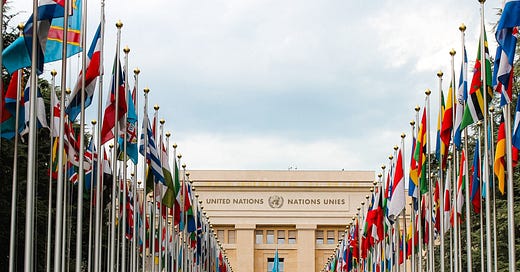Spoiled Rotten
Students at the United Nations International School launch an anonymous social media campaign denouncing their teachers as “racists” and “oppressors.”
The United Nations International School has succumbed to the new racial hysteria. Last year, students at the elite New York City school—which educates the children of UN diplomats at a cost of up to $44,000 per year—launched an anonymous social media campaign denouncing their teachers and administrators for their “vast history of systemic racism,” “white liberal racist thinking,” and “direct, intentional, repeated racial trauma.” The student threatened to “cancel” their “oppressors” through social media shaming—and administrators immediately caved in to their demands.
The saga began last June, when a group of students launched an anonymous Instagram channel, Black At UNIS, which started posting dozens of anonymous and unverified accusations against the school and specific teachers. The accusations range from “microaggressions”—a teacher who “used to mix up names of Black students”—to “white leadership failure,” such as refusing to hire black teachers and ignoring the bullying of black students. The Instagram account demanded that the school “fire the racist principals” and threatened to begin naming their “oppressors,” arguing that “if you’ve been called out on this account, no one is obligated to forgive you, especially not those that you’ve traumatized.” They pledged a policy of no mercy: “No one is obligated to protect you from those consequences and no one is obligated to forgive you.”
Later in the summer, the students formalized their demands in an online petition, which was signed by students, alumni, and parents. The petition begins by claiming that “for too long, UNIS has carefully curated the illusion of itself as a multicultural utopia while Black students and other marginalized groups suffer from a culture of ignorance and isolation.” The group demanded that the school hire a director of diversity and inclusion, institute mandatory antiracism trainings, “decolonize” the curriculum, create “safe spaces” for minorities, support the “exploration of diverse gender identities,” reject the “Eurocentric focus of mainstream academia,” and push an “agenda of intersectionality.”
This caused an immediate stir among administrators, teachers, and parents. Within days of the launch of the Instagram channel, Dan Brenner, the executive director of the school, sent an email to parents pledging that the school was “committed to creating solutions to ensure an anti-racist environment.” By the end of summer, Brenner had hired a diversity consulting firm to conduct antiracist trainings, created a student-led antiracist board, began overhauling the academic curriculum to reflect the new orthodoxy, and hired a full-time Director of Diversity, Equity, and Inclusion. According to one source within the school, Brenner and the board of trustees “completely caved in to pressure from these ‘activists,’ and passively accepted [the] list of their demands without hesitation.”
Other members of the school community had a different reaction. One staff member told me that the school “is currently in the grips of a mania,” which has led to an unprecedented amount of “division, paranoia, and hatred” within the institution. This employee said “there are a small number of employees that see this ‘antiracist training’ as pure indoctrination, but do not know what to do.” Like Brenner and the school administrators, they are afraid of being labeled “racist” and being denounced on social media. In the formulation of the student activists—and the overall framework of woke progressivism—to disagree with any part of their agenda is an admission of racism, and an invitation for reputational harm. And with such incentives in place, the anonymous activists are able to steamroll the institution and establish an inside-outside game: they mobilize power within the institution and ensure compliance through outside threats.
Remember: the United Nations International School is the educational choice of the world’s elites. The school teaches the children of global diplomats, as well as those of Manhattan families who work in international banking, finance, technology, and business. The politics at the school is decidedly liberal and progressive. According to one source, after the election of Donald Trump in 2016, the school held “three days of counseling” and “a series of emergency assemblies where tearful students ranted about being deported.” When then UN Ambassador Nikki Haley enrolled her children at the UN School, the source said, she was “roundly despised as a ‘Trump enabler’ by faculty and staff.”
The dynamics at the UN school reveal the nature of our larger political moment. The children of society’s elites—the most privileged people on the planet—have adopted the mantle of the oppressed in order to satisfy their own moral narcissism and exercise power over their elders. And the adults, supremely anxious about any threat to their status, immediately bow to the teenagers leading the online mob. This basic pattern is now replicating itself through every major institution in the country, from federal agencies to state boards of education to Fortune 500 companies. More than anything, what’s needed in America is moral courage—precisely the virtue that has vanished from the character of men who administer the American institutions.
When reached for comment, the executive director of the school, Dan Brenner, said the institution must commit to “anti-racist beliefs” in every aspect of its operations. “It is important for all facets of the UNIS community to engage in an honest dialogue on race and privilege to improve the character of our community. At UNIS, Black Lives Matter.”
Originally Posted at New York Post.



